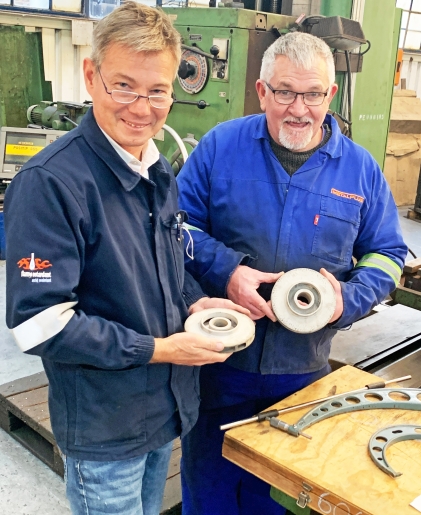When ACTOM Turbo Machines investigated the damage caused to two multi-stage pumps that had failed while in operation it found that the pumps’ thin-walled stainless steel impellers and intermediate casings had suffered extreme material loss due to rubbing.
The multistage pumps are used to pump light hydrocarbons in one of the chemical plants of a large local petrochemicals producer.
ACTOM Turbo turned to its fellow ACTOM division Metalplus to see if it would be able to perform the complex weld repair and remanufacturing work that was required during the emergency breakdown.

Roman Mornau, Metalplus’ Divisional CEO, said: “We first set out to perform the repairs using cold metal transfer (CMT) and laser welding technologies, but both proved to be unsuitable for the purpose.
“We were also advised by casting experts that such thin-walled impellers couldn’t be cast either, so we finally resorted to 3D printing – also known as additive manufacturing technology – which turned out to be the correct solution to the problem,” Roman stated.
Due to a pressing need to produce the new components very quickly to enable the pumps to resume operation as soon as possible, Metalplus engaged with two local 3D printing operators so that they could manufacture the required components in parallel to save time. One of these was the CSIR’s National Laser Centre (NLC), which 3D printed eight of the impellers by a laser-printing method. The remaining four impellers were manufactured by a local private sector 3D printing company, which applied a metal powder sintering process for the purpose.
“Before the 3D printing of the impellers was carried out, we applied reverse engineering to generate 3D graphic models for the two manufacturers to work from. In these 3D models we made provision for additional wall thicknesses to allow for final machining of all working surfaces, as well as keyway cutting and bore-grinding, as the 3D printed surface finish is not accurate enough for final use,” Roman pointed out.
The 3D printing took twice as long to complete than intended – eight weeks instead of the planned four weeks – as it was disrupted by frequent load-shedding, resulting in a high scrap rate due to the process having to be repeated after each of the load-shedding disruptions.
ACTOM Turbo had in the meantime manufactured a new shaft and, upon receiving the newly manufactured impellers and casings from Metalplus in mid-December last year, it re-assembled the pumps along with spare parts supplied to it by the customer and installed and re-commissioned them in the plant.
“When the first pump resumed operation it ran perfectly. The operator was able to restart production before the second pump’s spare parts from the pump manufacturer arrived in South Africa,” Roman concluded.

